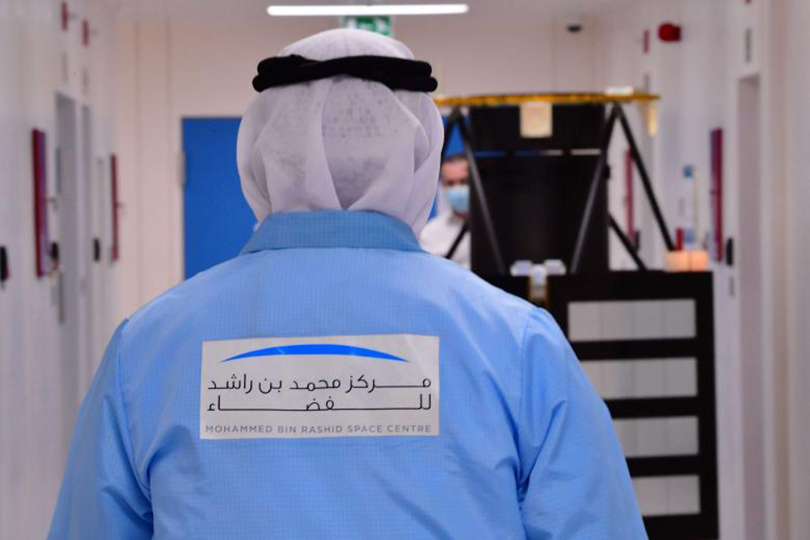Space is rapidly becoming a new domain for Middle Eastern states to project their power and vie for leadership in the region. The United Arab Emirates (UAE) is a case in point, with a mission to Mars to be launched this week. A national countdown to July 17* is meant to excite Emiratis and Arabs in general, for it marks the first time an Arab state launches a mission into outer space.
The Emirati government has named its Mars Mission Hope Probe, coloring it with a pan-Arab sentiment. The mission invokes past Arab Islamic achievements in the sciences and incites Arabs to maintain that spirit. There is no shortage of nationalist fervor, either. The UAE has timed the completion of its mission before the 50th anniversary of the federation’s founding in December 2021. It has also tied it to its 100-year goal of establishing a human colony on Mars by 2117.
The UAE has been marketing this science-driven apolitical Arab narrative of hope, but its space policy is more than that. It aims to reinforce its newfound regional power status and align the Middle East’s geopolitical order to its advantage. It has also, by default, ushered in a regional space race, something relatively novel in the Middle East. The UAE’s ability to complete its Mars Mission, and how this factors into its activist foreign policy, will determine the degree to which the UAE transforms itself and the region in the process.
The UAE prides itself on being the “first, biggest, and best.” But it cannot claim that in relation to space. Israel was the first state in the region to begin a space program in 1983. Israel benefited from U.S. expertise and was able to launch a reconnaissance satellite in 1988. The Israelis also tried, but failed, to land on the moon in 2019.
Though the Israeli space program is the oldest in the region, it has not been a priority for Israel. That is not the case with Dubai, which founded the Mohammed bin Rashid Space Center in 2006. The center was expanded by the federal government in 2014 with the creation of the UAE Space Agency. Knowing that it does not have the expertise, the UAE partnered with three U.S. academic institutions to jointly design and build its mission to Mars. The Emiratis assembled a team to support their effort, with an average age of below 35, a third of whom are women, headed by a young female minister tasked with advancing science. These steps reflected the UAE’s branding of itself as a champion of youth and women, while marketing this enterprise as an international collaboration that included manufacturing in the United States and a launch from Japan.
Other than Israel, Iran has also been active regionally in space. Its international collaboration has not been as intense as the UAE’s. Yet Iran has been producing satellites since establishing the Iran Space Agency in 2004, making it the second space state in the region. It has also sent animals into space, and launched a military satellite last April. Tehran’s early collaboration with Russia and China paid off with its first locally built satellite in 2009, which it named Omid, or Hope, the same name the Emiratis chose for their Mars mission.
The UAE is not the first Arab state to show an interest in space. Saudi Arabia led a pan-Arab effort in 1976 to establish the satellite operator Arabsat. The Saudis also produced the first Arab astronaut, Prince Sultan bin Salman. His participation in a mission of the space shuttle Discovery in 1985 was to be followed by a Saudi space policy, but this was put on hold after the crash of the Challenger.
By venturing into this domain, the UAE wants to position itself in a field long occupied by regional adversaries such as Israel and Iran. Emirati thinking is focused on differentiating the UAE from others and advancing its own agenda despite challenges. The UAE has much to gain if its mission to Mars succeeds—a feat only accomplished by the United States, the former Soviet Union, India, and the European Space Agency. Space is the Emiratis’ next convenient card to raise their country’s standing. Doing this would allow the UAE to bolster its post-2011 rise as a middle power in a region whose traditional centers—Egypt, Iraq, and Syria—have waned. This would grant the UAE an increasing say on thorny regional issues, such as peace with Israel, a nuclear deal with Iran, the Yemen conflict, and the dispute within the Gulf Cooperation Council.
The UAE’s actions in space have not gone unnoticed in the region. Saudi Arabia and Turkey created space agencies days apart in December 2018. Egypt joined the club soon thereafter in August 2019. Not wanting to allow this moment of regional attention to space to go to waste, the UAE established the first pan-Arab Space Coordination Group in 2019. It brought together eleven Arab states whose first goal is to develop “813,” a satellite to monitor earth named after the year in which the famed Arab House of Knowledge reached its peak upon Al-Ma’mun’s ascension to the caliphate. However, paying homage to Arab history did not mean the UAE would avoid standing out. It left for itself the more high-profile feat of a Mars exploration mission, while leaving the less ambitious goal of building a satellite to the Arab conglomerate.
Arabs and their neighbors have historically set their sights on the sea and land for sustenance. Now, space offers a new arena for potential development, competition, and conflict. For the UAE, its ability to shape regional geopolitics to its advantage is filled with hazards, especially with its risky foreign interventions. If successful, its space program can offset some of these risks and provide a chance for a UAE-centric worldview to prevail in an ever-changing Middle East.







Comments